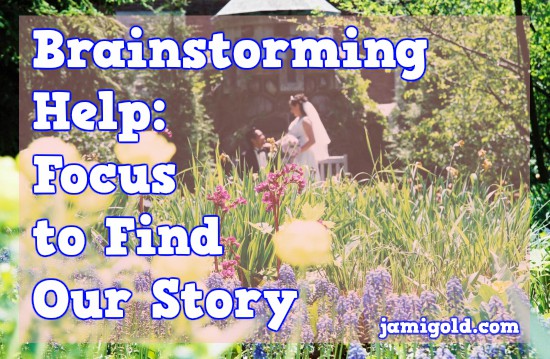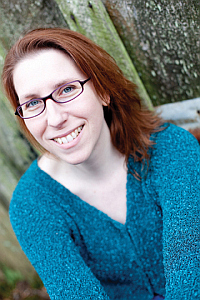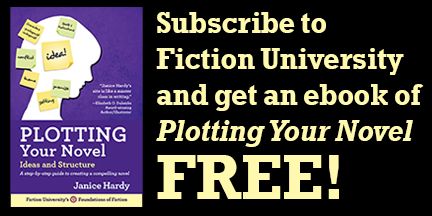How to Use Focused Brainstorming to Develop Our Plot — Guest: Janice Hardy

Unless we’re only ever going to write just one book, we need to improve our ability to develop an idea into a story. That means we might want to strengthen our process for discovering our story’s characters, the point of their struggles, and the plot that leads readers from page to page.
Story development skills are especially important if we’re going to participate in NaNoWriMo next month. Right now is the perfect time to get our story idea ready for drafting.
Last week, I shared story development resources and information about my Lost Your Pants? workshop to help us prepare (whether we’re plotters or pantsers), but sometimes we need help even before we start planning our first scene. That’s why I’m excited to highlight another resource—this one to help us with that very first step of brainstorming—here today.
Author and blogger extraordinaire Janice Hardy is well known for her Fiction University blog. Or if you don’t know her, you should. Her site is fantastic—one of my absolute favorites. *grin*
Janice has guest posted here before to talk about:
- writing in deep point of view,
- how to unstick our plot,
- finding the right balance of backstory,
- avoiding flat descriptions, and
- ensuring our story has the “right” kind of conflict.
Today she’s here to share how we can start developing our story idea through focused brainstorming. Her insights might be able to help us whether we plot or write by the seat of our pants. Also, read all the way to the end to hear about her special (free!) deal to help more with developing our story’s plot.
Please welcome Janice Hardy! *smile*
*****
6 Questions to Ask to Find Your Novel’s Plot
by Janice Hardy, @Janice_Hardy
My husband and I play “what if?” a lot. One of us (usually him) will toss out a question, and we’ll run with it, exploring as many scenarios as possible. It started out as a game to entertain us on long car trips, but it’s evolved into an endless stream of novel ideas for me.
Need to turn an idea into a story? Try this method by @Janice_Hardy to focus your brainstorming Click To TweetYou’d think this would be a fabulous resource for a writer, but I end up with too many ideas. I can’t possibly write them all, and not every idea—no matter how cool it sounds at the time—will make a good novel.
That’s the sneaky thing about ideas. They’re fun, they sound exciting, and they seduce us into thinking that all we need is that one, single idea to write a great novel.
It doesn’t always work that way.
An Idea Isn’t a Story
I’ve had many an idea that felt like “the one,” dived right in and started writing, only to discover later that I didn’t have a story, much less a plot, that would allow me to write an actual novel.
This is one reason some novels stall after fifty or a hundred pages. As great as ideas are, a novel needs a strong foundation to build upon. It needs structure to carry that great idea and give it form, and a foundation on which to grow. It needs a story worth telling.
What helps, is brainstorming that idea before you do anything with it.
4 Elements to Brainstorm into Lists
Brainstorming is a great way to dig deeper into an idea to see if it really does have the legs to carry an entire novel. Any idea that falls flat after a few minutes of brainstorming is one that probably would have you banging your head against the keyboard by chapter three.
Think about the storytelling elements that will help you plot later. Take notes, jot down whatever comes into your head. Nothing is off limits here, and you’ll refine these ideas later.
Consider these four elements:
#1: The Conflict:
Something in the idea has to be able to cause trouble, and hopefully to a lot of people. If it can’t, there won’t be anything for the protagonist to strive for.
No matter how cool an idea sounds, if there’s no conflict, there’s no novel yet. No idea is too crazy at this point, because it’s all about exploring the idea’s potential, and you never know where one idea might lead.
#2: The People You Can Put into This Idea or This Conflict:
- Who would be affected?
- Who would benefit?
- Who would be hurt?
- What kinds of people would be needed for this situation?
- What connections might those characters have to the other people in the story?
Conflict often comes from those connections, and they can help you develop the plot later.
#3 :The Goals and Stakes:
Without knowing what the characters want and what they’re risking to get it, the novel will be pretty boring. Goals and stakes move the plot and make readers care about what happens.
#4: The Themes:
See if any themes have started to develop. They often do, even this early, with recurring concepts between possible character types and the conflicts discovered.
If you have several ideas that interest you, ask the same questions of all of them to see which one has the strongest potential for a novel. If they all feel strong, start thinking about which one grabs your attention . Your excitement for the idea will translate to the novel itself, which will help make the novel better in the end.
6 Questions to Develop Brainstorming Lists into a Story
Now that you have some things to work with, look back at your original idea and ask:
-
Who Wants What and Why?
This will be your cast of characters and some goals and motivations for the story.
-
Who Would Be Against These Goals and Why?
This will be your antagonist, and the reasons behind his, her, or its actions.
-
Is There One Major Conflict or Problem That Needs Solving?
This will be the core conflict of your story, and the main problem driving the entire plot.
-
Who Is the Most Likely Person to Be Involved in This Problem on a Personal Level?
This will be your protagonist and the one driving the plot.
-
Where Can Huge Failures Occur (because that might just turn out to be what your protagonist is after)?
These are some places that might be good turning points in the novel.
-
What Situations Would Lend Themselves Well to the Growth of a Character?
These are some places that might be good turning points in the character arc.
For some writers, this is all they’ll need to start the novel. Others will want to flesh these out more and develop a solid outline. There’s no right answer here, just do as much as you need to feel comfortable writing your novel.
If you get stuck, try going back to these questions and seeing if you missed any key moments. Maybe all you need is another brainstorming session to fill in those holes.
And to help make plotting your novel a little easier, check out my deal below!
*****
 Janice Hardy is the award-winning author of the teen fantasy trilogy The Healing Wars, including The Shifter, Blue Fire, and Darkfall from Balzer+Bray/Harper Collins. She also writes the Grace Harper urban fantasy series for adults under the name, J.T. Hardy.
Janice Hardy is the award-winning author of the teen fantasy trilogy The Healing Wars, including The Shifter, Blue Fire, and Darkfall from Balzer+Bray/Harper Collins. She also writes the Grace Harper urban fantasy series for adults under the name, J.T. Hardy.
When she’s not writing fiction, she runs the popular writing site Fiction University, and has written multiple books on writing, including Understanding Show, Don’t Tell (And Really Getting It), Plotting Your Novel: Ideas and Structure, and the Revising Your Novel: First Draft to Finished Draft series.
Website | Facebook | Twitter | Pinterest | Goodreads
Amazon | Barnes & Noble | iTunes | Indie Bound
*****
Special Offer from Janice Hardy:
Need help plotting your novel? Want plotting to go a little easier? Thinking of participating in NaNoWriMo?
I’m giving away my Plotting Your Novel: Ideas and Structure ebook for free until October 15 just for subscribing to my site, Fiction University (which is full of writing advice and helpful tips). It’s my way of saying thank you to the writing community for all their years of support. Check out the details here.
*****
Thank you, Janice! This is perfect information, and just what we need if we’re getting ready for NaNo. A free ebook for signing up for your fantastic site is a wonderful bonus too!
Writers often talk about brainstorming but leave the details of how to do so a bit vague, maybe because it seems too random to create a process for. But these questions from Janice give us a way to focus our brainstorming and come out with the answers we need to develop our story. *smile*
How do you like to develop a novel? Are you a planner or a panster? Have you consciously used brainstorming before, or do you wait for ideas to come to you? Do you think using focused brainstorming might help you with your story ideas? Do you have any questions for Janice?
Pin ItWant to write faster? Or finish NaNoWriMo?
Join Jami in a workshop to learn how to do just enough story development to write faster, even if we write by the seat of our pants.
Click here to learn more!


Thanks so much for having me, Jami!
Thank you for the great post! 😀
“Where Can Huge Failures Occur?” Now there’s a handy little question for wreaking devastation upon the best laid plans of mice, men etc. Thanks, Janice!
And thanks for the encouraging perspective that I actually do have some idea what I’m doing with this book (characters, motivations, incidents) even though I am frequently overwhelmed by how much I still don’t know!
Hi Deborah,
LOL! I know what you mean about actually having some idea of what we’re doing with a book. As a pantser, I’m often fighting the fear that I don’t know, but when I stop and think about it–like in this post–it turns out I do know. 😉 Yay!
I’m in awe of pantsers. I don’t know how you do it. I’d get so lost and have to rewrite everything a dozen times 🙂
Glad I could help 🙂 We all feel overwhelmed at times, even when we’ve been doing this for ages. Sometimes the story falls out of our heads, other times we have to drag it kicking and screaming onto the page.
I needed this so, so much right now. I’m so rusty that the idea spark I got weeks ago has just been moldering away in the ashes of my old and currently ineffective writing habits.
Happy I could nudge you and fan those ashes a little 🙂
Thanks!
[…] Another important element of fiction is plot. Janice Hardy sets out 6 questions to ask to find your novel’s plot. […]
[…] Janice Hardy: How to Use Focused Brainstorming to Develop Our Plot […]